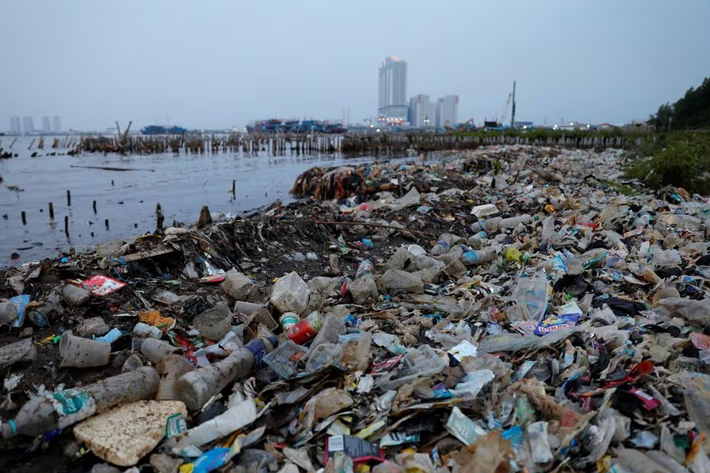A handful of oil-producing countries were blamed on Monday for the collapse of talks on a global treaty to curb plastic pollution, despite more than 100 nations wanting to a cap on production.
There had been hopes that the fifth round of talks convened by the UN Intergovernmental Negotiating Committee in South Korea would result in a legally-binding treaty, but organizers and critics said a small number of oil producers were only prepared to act on plastic waste.
Countries remained far apart on the basic scope of a treaty and could agree only to postpone key decisions and resume talks to a date in 2025.
ALSO SEE: Asian Steelmakers Failing on Shift to Renewables, Survey Finds
“It is clear that there is still persisting divergence,” Inger Andersen, executive director of the UN Environment Programme, said.
The most divisive issues included capping plastic production, managing plastic products and chemicals of concern, and financing to help developing countries implement the treaty.
An option proposed by Panama, backed by more than 100 countries, would have created a path for a global plastic production reduction target, while another proposal did not include production caps.
Saudi fought moves to cut plastic pollution
The fault lines were apparent in a revised document released on Sunday by the meeting’s chair Luis Vayas Valdivieso, which may form the basis of a treaty, but remained riddled with options on the most sensitive issues.
“A treaty that … only relies on voluntary measures would not be acceptable,” Juliet Kabera, director-general of Rwanda’s Environment Management Authority, said.
“It is time we take it seriously and negotiate a treaty that is fit for purpose and not built to fail.”
A small number of petrochemical-producing nations, such as Saudi Arabia, have strongly opposed efforts to reduce plastic production and have tried to use procedural tactics to delay negotiations.
“There was never any consensus,” Saudi Arabian delegate Abdulrahman Al Gwaiz said. “There are a couple of articles that somehow seem to make it (into the document) despite our continued insistence that they are not within the scope.”
China, the United States, India, South Korea and Saudi Arabia were the top five primary polymer-producing nations in 2023, according to data provider Eunomia.
‘Important for emissions’
Had such divisions been overcome, the treaty would have been one of the most significant deals relating to environmental protection since the 2015 Paris Agreement.
Carbon Brief said a global plastics treaty has important implications for climate change, because “the production, use and disposal of plastics is responsible for around 5% of global greenhouse gas emissions and they are typically made from fossil fuels.”
“This is roughly three times more than the emissions produced by aviation,” it said.
“Plastics production is expected to be one of the leading drivers of oil demand growth over the coming years,” it said.
“Measures to reduce plastics use will be a key part of the agenda, as around 90% of emissions from plastics come from production.”
World ‘held hostage’ by a few countries
The postponement comes just days after the turbulent conclusion of the COP29 summit in Baku, Azerbaijan.
At Baku, countries set a new global target for mobilizing $300 billion annually in climate finance, a deal deemed woefully insufficient by small island states and many developing countries.
The climate talks were also slowed by procedural manoeuvres by Saudi Arabia – who objected to the inclusion of language that reaffirmed a previous commitment to transition away from fossil fuels.
Some negotiators said a few countries held the proceedings hostage, avoiding compromises needed by using the UN’s consensus process.
Senegal’s national delegate Cheikh Ndiaye Sylla called it “a big mistake” to exclude voting during the entire negotiations, an agreement made last year during the second round of talks in Paris.
“This outcome underscores the complexity of addressing plastic pollution on a global scale and the need for further deliberations to achieve an effective, inclusive and workable treaty,” Chris Jahn, council secretary of the International Council of Chemical Associations (ICCA), representing plastic makers, said.
“There is little assurance that the next INC will succeed where INC-5 did not,” environmental group GAIA said.
Plastic production is on track to triple by 2050, and microplastics have been found in the air, fresh produce and even human breast milk.
Chemicals found to be of concern in plastics include more than 3,200 according to a 2023 UN Environment Programme report, which said women and children were particularly susceptible to their toxicity.
Despite the postponement, several negotiators expressed urgency to get back into talks.
“Every day of delay is a day against humanity. Postponing negotiations does not postpone the crisis,” Panama’s delegation head Juan Carlos Monterrey Gomez on Sunday, said.
“When we reconvene, the stakes will be higher.”
- Reuters with additional input (Carbon Brief comments) and editing by Jim Pollard
NOTE: Text was added to this report on Monday December 2, 2024.
ALSO SEE:
Lacklustre COP29 Deal Shows Strains of Climate Cooperation
COP29 Finance Deal Aims For $250bn From Wealthy Nations
Could Melting Glaciers Trigger Volcanic Eruptions? – Reuters
Funding Gap Hurts Climate Talks While World Faces 3.1C Warming
Climate Change Has Cost China $32 Billion in Just One Quarter
Scientists Fear Nature’s Carbon Sinks Are Failing – Guardian
Floods or Drought: Climate Change Worsens Global Water Woes
Climate Change ‘Fuelled’ Rain That Led to Fatal Indian Landslides
























